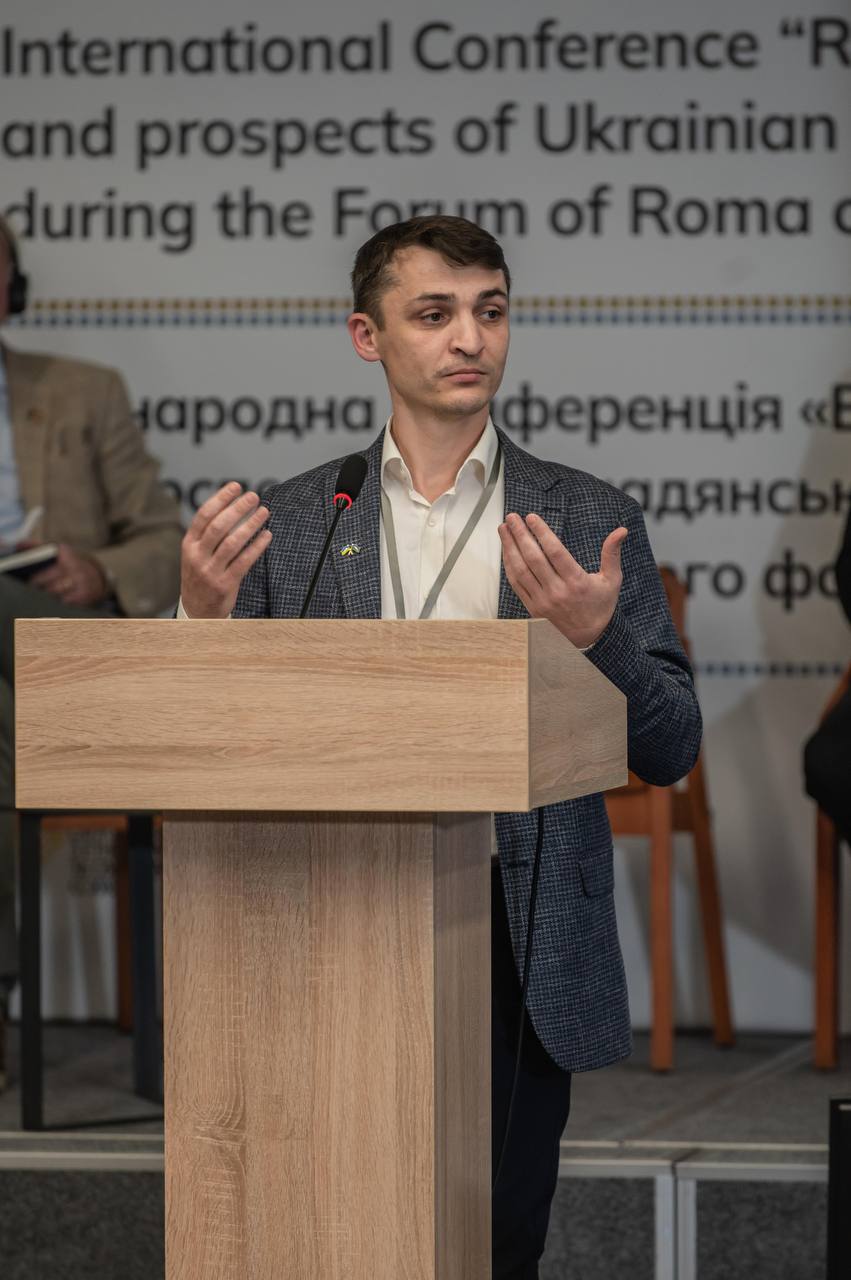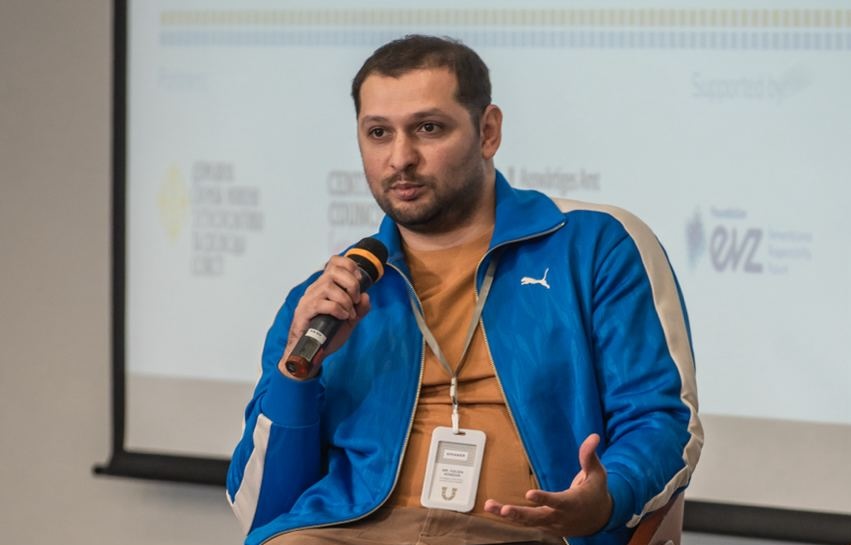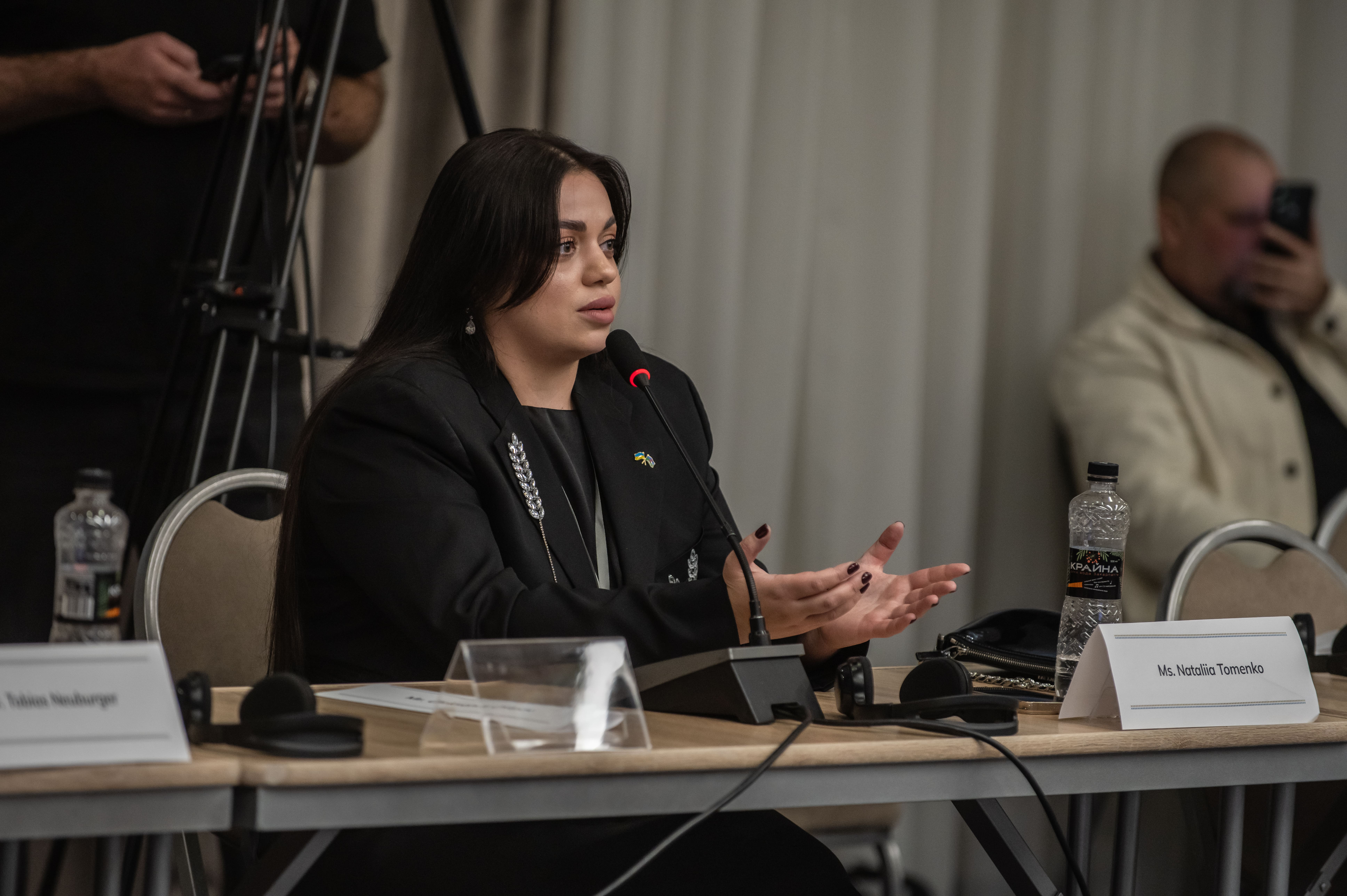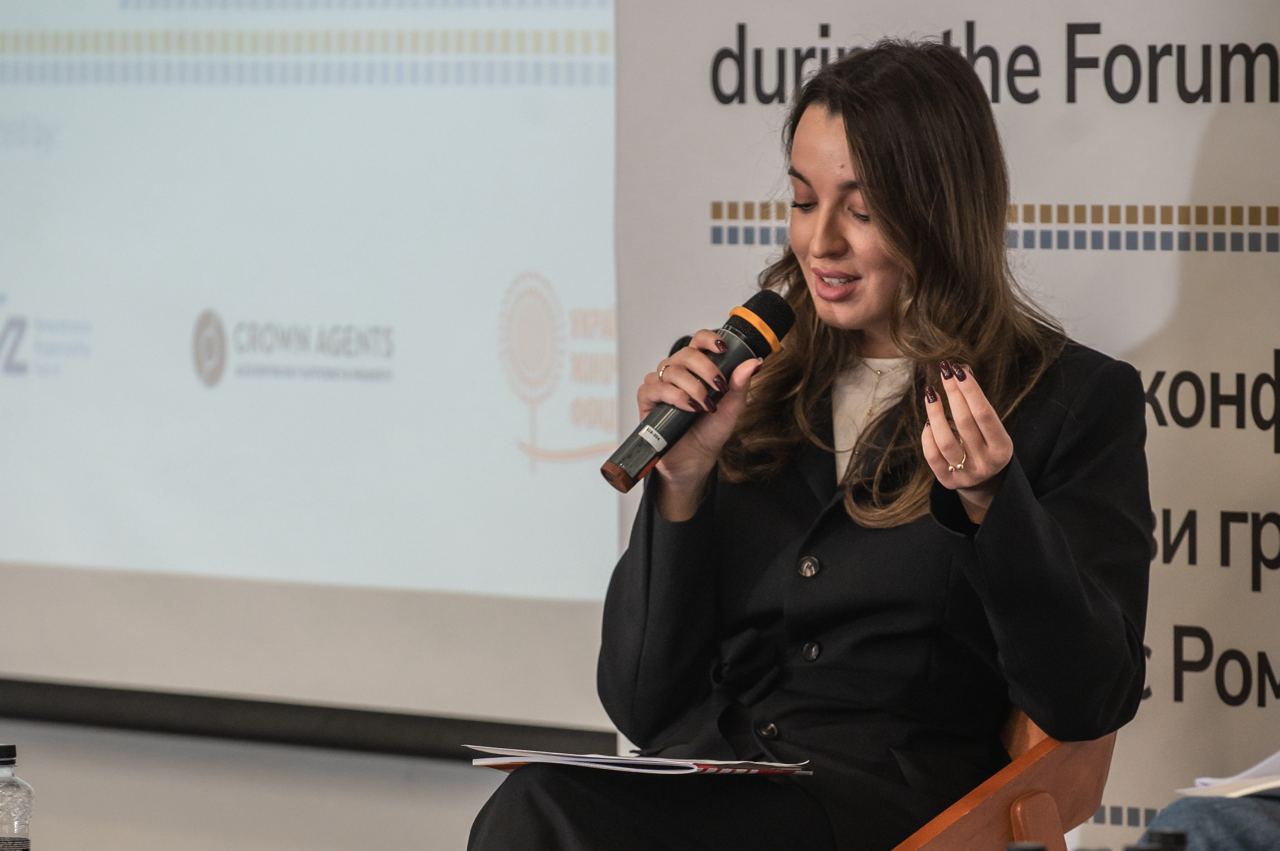Discussing Romani issues on the international level
Representatives of NGOs, Ukrainian state authorities, EU, and UN have convened in Kyiv to discuss the rights and issues pertaining to the Romani community in Ukraine. Why is this important and why our future depends on it? Listen to the Ai Tu Jianes podcast and find out.
On the 30th and the 31st of October, Romani issues were discussed in Kyiv on an international level, within a conference entitled «Restoration of Ukraine and Prospects of Civil Society for Ukrainian Romanis» attended by representatives of EU, UN, state authorities, NGOs, and international partners.
The Conference was organised by ARСA Youth Agency for the Advocacy of Romani Culture in collaboration with the Ukrainian State Service for Ethnic Policy and Freedom of Conscience and Central Council of German Roma and Sinti People. The event was supported by EU Representative Office in Ukraine and the German Foreign Office.
«This year's conference was dedicated to the reconstruction of Ukraine. It is our opinion that the reconstruction of Ukraine not only means physical rebuilding of its infrastructure but also reconstruction of the entire society. The society must get rid of those burdens and problems which we had experienced in the prewar period», — explained Volodymyr Yakovenko, the Executive Director of ARСA Youth Agency for Romani Culture Advocacy.
 Photo: Volodymyr YAKOVENKO
Photo: Volodymyr YAKOVENKO
The Conference was opened by Katarina Maternova, EU Ambassador in Ukraine. She emphasised that the attitude towards minorities is an important indicator of Ukraine's readiness to EU accession.
«Ms Katarina Maternova as well as other guests from abroad noted that there is not one country that would have been perfect. Anti-Gypsyism, discrimination against the Romani community can likewise be observed elsewhere in the EU. What is of interest to us here, though, is the level (degree) of such discrimination. Ukraine has made a step ahead and recognises that Romanis are one of the most vulnerable strata of population. Occasionally, though, it is anti-Gypsyism that is not being recognised by the state. Which is why we want the state to listen to our recommendations—to the recommendations of the Romani civil society. The case in point is not some kind of a privileged position for the Romani community; the case in point is merely equality», — added Volodymyr Yakovenko.
The agenda of panel discussions within the conference covered issues and challenges within the Romani community: humanitarian issues, accommodation issues, matters pertaining to employment and education, the role of Romanis in modern-day Ukraine and its postwar reconstruction, combatting anti-Gypsyism and support received from the state in these processes. As it had been noted earlier, as per recent researches published by SeeD, USAID та UNDP, 35% of Ukraine's population have an unfavourable opinion of the Romani presence in their communities.
Yuliian Kondur, project co-ordinator of the international charity organisation «Romani women’s fund «Chirikli» has told us that his NGO has teamed up with national human rights advocacy institutions (particularly, with the Ombudsman's Office) and are detecting instances of discrimination or infringement of rights which they then relay to the corresponding institution to take action.
«We team up with the State Service for Ethnic Policy which is the to-go authority as it co-ordinates the implementation of the Romani Strategy. We collaborate with the Ministry of Education, Ministry of Health Care, and Ministry of Social Policy. We initially interact with them using the data which we assemble on the basis of testimony provided by people. Sometimes, we have some specific situations which we discuss systematically, in order to be able to find certain systemic solutions», — added Yuliian Kondur.
 Photo: Yuliian Kondur
Photo: Yuliian Kondur
As per unofficial data, approximately 400,000 Romanis—belonging to different ethnic subgroups, each having its cultural and social peculiarities—had been living in Ukraine before the full-scale Russian invasion. As per Representative of the Office of Ukrainian Parliament's Ombudsman, approximately 100,000 Romanis have become refugees as a result of Russia's full scale invasion and have left the country. Approximately the same number have become internal refugees. The war has exacerbated the problem which plenty of Romanis had faced even before the war: the absence of personal IDs. In view of that, in the summer of 2023, Ukrainian Ombudsman Dmytro Lubinets launched the implementation of a pilot project in Transcarpathia, entitled: «Documentation of Romani Citizens and Developing Legal Mechanism to Facilitate this Procedure». As Yuliian Kondur explains, the practical implementation of this project has turned out to be far from simple—even within the limits of Mukachevo city. The most complicated undertaking was how to detect people without IDs and how to explain to them why it is that they need IDs.
Another topic covered within the conference was gender issues. The participant discussed both long-lasting and novel challenges faced by women, both within the Romani communities and against the background of the ongoing war.
At a round table discussion held within the conference, Nataliia Tomenko, Deputy Director of ARKA Youth Agency for the Advocacy of Romani Culture, has emphasised that the movement of Romani women has picked up momentum even before Russian aggression. Once the full-scale invasion began, however, the range of problems has considerably expanded.
 Photo: Nataliia Tomenko
Photo: Nataliia Tomenko
«Romani women have to be responsible for a lot of things: for their families, for their children, for the moral and psychological well-being of their families. After all, as your husband is serving in the Ukrainian Armed Forces, it is quite difficult for a woman to maintain mental health within her family and support it financially at the same time. The number of responsibilities has increased but the support has not. There is, however, one rather nice thing that has been happening in these horrendous times: the Romani movement is gaining momentum, it is becoming stronger as it teams up with similar movements of other ethnic minorities. And women understand how important such teamwork is», — stressed Nataliia Tomenko.
Anzhelika Bielova, President of the Holos Romni Association of Romani Women has noted that not only does a crisis bring about new problems but it does bring new possibilities, too.
«For as long as this Great War of ours has lasted, we have been able to build up our team and the regional representative offices of our organisation. As of today, we have four regional representative offices, a team comprised of up to 50 members based in Zaporizhzhia, Kharkiv, Kryvyi Rih, and Uzhhorod. A number of humanitarian donors have come to Ukraine; these donors have very high due diligence requirements. But that is exactly the thing that urges our organisation to grow at such an amazing rate. If you want to gain access to those possibilities, you have to grow and develop», — says the activist.
Problems that have exacerbated in wartime include plain poverty. Romanis, being the most vulnerable community in Ukraine, have ‘tasted’ more than enough of it.
«People virtually live below the poverty line. It is my opinion that this there is a very wide gap between the financial situation of Romani women and of other women. Because, as far as Romani women are concerned, we should throw in economic inaptitude, low level of education, and discrimination faced by them in all walks of life», — Anzhelika Bielova emphasised.
 Photo: Anzhelika Bielova
Photo: Anzhelika Bielova
To summarise the Conference, Ukrainian Romani NGOs have come up with a Position Document containing general recommendations with regard to policy towards Romanis. This Document has been prepared and has been handed over to the state authorities and the international community.
One particular emphasis has been made on the fact that the Romani Strategy 2030 adopted by Ukraine should be reviewed, updated, and adapted to the wartime conditions, and that it should comply with EU legislation requirements. As has been stressed by Volodymyr Yakovenko, measures taken by the state are but of local (situation-specific) character whereas it is impossible to resolve systemic problems without a systemic approach.
«As we discuss the protection of Romani rights and resolution of issues which Romanis face in everyday life, we are also discussing problems of the Ukrainian society in general as well as problems faced by other ethnic, religious, sexual minorities residing within the territory of Ukraine: problems of Ukrainian citizens. Recommendations thus offered are not exhaustive. That said, even if they are partially considered and implemented, not only will this speed up Ukraine's EU accession but also will turn Ukraine into an example to be followed by the entire world, in opposition to the Russian-fuelled propaganda transmitting allegations of ostensible persecution of diverse ethnic groups in Ukraine», — says Volodymyr Yakovenko.
You can listen to the full (audio) version of this material in the PODCASTS section
See also
- «Невидимі. Стійкість: минуле і сучасність ромів». Як зрозуміти історію ромів через візуальну культу
- Альфреда Марковська: історія життя і порятунку інших
- «Дивись і не забувай»: 15 років Dikh He Na Bister у Кракові
- ФОТОРЕПОРТАЖ: У Києві відкрили виставку про ромську історію та ідентичність
- «Відновлення пам'яті – роми у Варшавському гетто». Історична екскурсія у Варшаві
- PHOTO REPORT: Events commemorating the victims of the Roma genocide in Babyn Yar
- 2 серпня — Міжнародний день памʼяті жертв геноциду ромів
- Коли допомога — це більше, ніж ваучер
- Антициганізм поруч: як розпізнати упередження у звичних словах і жартах
- Стереотип замість культури: як TikTok спрощує ромську ідентичність